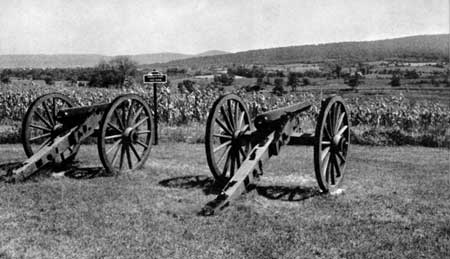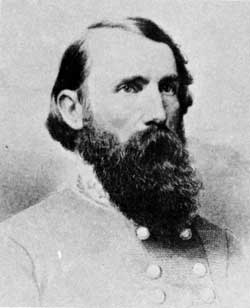|
ANTIETAM National Military Site |
 |

A Confederate battery on this site on the Harpers Ferry Road fired
on Burnside's men as they charged toward the left across the low ground
in the middle distance. A. P. Hill's division marched behind these guns,
going left, then turned off the road and passed through the cornfield to
hit Burnside's corps in flank.
A. P. Hill Turns the Tide
But now came a great moment in Confederate military annals. A. P. Hill's notable Light Division, having hurriedly crossed the Potomac, 3 miles away, was driving hard toward the jubilant Federals charging on Sharpsburg. Some of Hill's artillery had already arrived from Harpers Ferry with the cheering news that Hill's brigades of infantry were close by.
At Lee's urgent order, Hill had left Harpers Ferry early. Sensing the critical role they would play, urged on at sword point by their grim commander, Hill's veterans had covered the 17 miles from Harpers Ferry to the Potomac in 7 hours. Hundreds of men had fallen out, unable to keep the pace. Now, across the river, the stalwart survivors pounded on toward the sound of the guns.

Maj. Gen. A. P. Hill.
From an engraving by A. R.
Ritchie.
Suddenly the head of Hill's column appeared on the road to the south. Hill rode up to Lee's headquarters at the Oak Grove, then quickly to D. R. Jones, whose exhausted troops formed the last defense line in front of Sharpsburg. Hill's five brigades now rushed toward the Federal flank. Confusion gripped Burnside's men as this unexpected onslaught plowed into their lines. Men broke and started to run. In moments the tide had turned. The Federal lines, sagging from the overwhelming charge of the Southerners, and with gaping holes cut by artillery, fell back across the hills to the sheltering banks of Antietam Creek.
Powerful Federal artillery continued to thunder across the hills; heavy blue columns could still be seen in overmastering strength across Antietam Creek and far to the north. But the Federal commander had called a halt.
An hour and a half after the timely arrival of A. P. Hill's division from Harpers Ferry, the battle ended. With sunset, the firing died away. That night, the tired men lay on their arms in line of battle. Neither side would admit defeat; neither could claim the victory.

|

|
|
Last Modified: Mon, Mar 4 2002 10:00:00 pm PDT |


